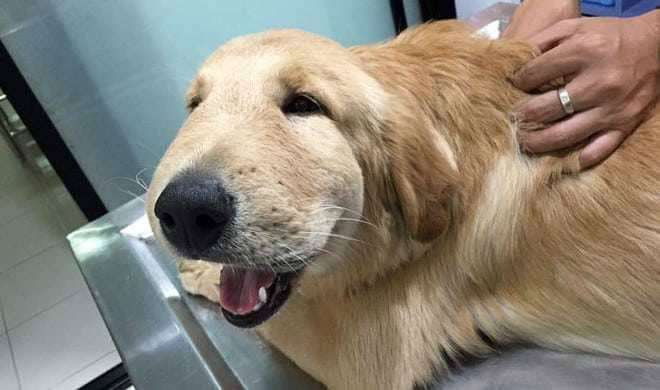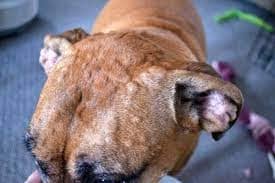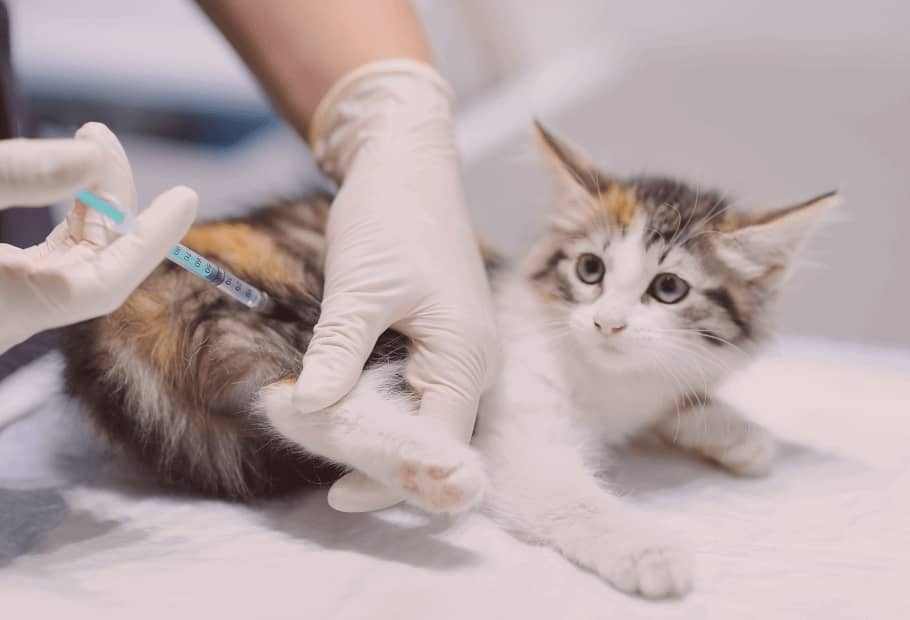Many vaccinations are needed annually, although rabies a couple of others can be done every 3 years. As such, most pet owners take their pets to the vet for annual immunizations. This is similar to people getting annual flu vaccinations.
While certain vaccinations are needed yearly, it’s important to remember that vaccinations represent stimulation of the immune system, and in some cases a hypersensitivity or allergic reaction can occur.
What is Considered a Normal Reaction?
After vaccination, it is usual for pets to return home and re-engage in normal activity; however, since vaccination is inflammatory by nature, sometimes there are mild symptoms for a couple of days:
- Pain at the vaccine site
- Mild Fever
- Lethargy
- Reluctance to play or exercise
- Reduced appetite
- Sneezing after a nasal vaccine
These are considered normal responses after being vaccinated and treatment is generally not needed. If your pet is very sore, sometimes an anti-inflammatory medication can help alleviate the pain. Your veterinarian can prescribe an appropriate medication. Avoid over-the-counter remedies.
What is not Normal and What Requires Treatment?

The following symptoms are more serious and your veterinarian should be notified at once, especially if they occur within hours of receiving the vaccine (although delayed reactions can sometimes occur 48-72 hours afterwards).
Occasionally, a reaction is more severe and potentially dangerous. As vaccine science has advanced, these reactions are less and less common but just as with people, a small subset can be affected and then you need to take action.
- Vomiting or diarrhea
- Facial swelling
- Hives
- Collapse
- Difficulty breathing
These symptoms can be part of a hypersensitivity reaction, which includes life-threatening anaphylactic shock, in its most severe form. Any symptoms from this list should be taken seriously and future vaccination plans should be altered to avoid recurrences. more severe problems.
If the vaccination schedule is not altered, these types of vaccination reactions can get worse with subsequent exposure. Vaccine reactions are the immune system in over-drive reacting to the infectious organism, vaccine stabilizers, preservatives in the vaccination or residue from the vaccine organism’s laboratory tissue culture.

Which Pets are Likely to Have Vaccination Reactions?
In October 2005, a study was published in the Journal of the American Veterinary Medical Association in which over 1 million canine medical records in over 350 separate animal hospitals were reviewed. In this study, approximately one in 250 dogs had some sort of vaccination reaction, which translated to 13 reactions for every 10,000 doses of vaccine given or more simply put, 1 in about 800.
The group at greatest risk for reaction were small breed young dogs. Reaction rates increased with the number of vaccinations administered at one time. Rates lowered with increase in age and size and a decrease in the number of vaccinations given at the same visit. Most reactions occur the same day as the vaccine is given.

Multivalent Vaccines vs. Multiple Vaccines
Some vaccine doses protect against multiple organisms. These are called multivalent vaccines and include the basic distemper-parvo vaccine for dogs and the Feline Viral Rhino Tracheitis (herpes), calicivirus and panleukopenia.
Since giving more vaccines at once is associated with an increased risk of reaction you might expect that using multivalent vaccines would also increase the risk of reaction, but surprisingly this was not found to be the case.
This may be due to the other agents mixed into each vaccine vials (for example: more vaccinations = more vials with more adjutant).
What to do During the Reaction
If your pet is having a reaction more severe than just some general tiredness or soreness, you should let your veterinarian know right away. If it is after hours, it is prudent to consult the local emergency clinic. Anti-inflammatory injections and an anti-histamine can be used to halt the inflammatory cascade before it gets dangerously out of hand. Be sure you know who to call in case of problems after your pet is vaccinated.
Vomiting may be a sign of an on-coming serious reaction, or could represent something as mild as car sickness. If vomiting is observed after vaccination, let your veterinarian know right away.
Preventing Future Vaccine Reactions
After a pet has had a vaccine reaction, what do you do the next time vaccinations are due? There are several steps that can be used as prevention.
Be Sure your Veterinarian is Aware of your Pet’s History of Vaccine Reaction
Obviously, if you know your pet has had vaccination reactions in the past, be sure to inform the staff so that proper pre-medication can be given. Do not wait until after vaccines have been given and THEN inform the staff that there is a history of reaction.
It is also extremely helpful to know what the reaction consisted of: for example, facial swelling and hives vs vomiting and diarrhea vs shock. If you know what vaccines preceded the reaction, the staff will also need to know that.
Be Prepared to Pay for Extra Pre-Medications and/or Observation
Medications such and antihistamines or corticosteroids can be used to head off allergic reactions before they happen, and with the use of these medications a reacting pet can be vaccinated normally or have the vaccinations split up to one per visit.
To be safe, it is frequently recommended that the pet be observed for several hours following vaccination, despite the medication. Allow extra time for the pre-medications to be in effect before vaccinations are given. Consult your veterinarian for a recommendation.
Avoid Giving Several Vaccinations at Once
Keep in mind that vaccines given within two weeks of each other can interfere with each other so you do not want to separate vaccines by less than a two-week period but separating vaccines can mean your pet has less stimulation to deal with at one time.
Breaking up vaccination also helps determine which vaccine is the culprit as well as reduce the risk of reaction. If multiple vaccines are due, consider spreading them out by at least 3-4 weeks if possible. It may be tempting to request giving half doses to reduce immune stimulation, but this will not result in complete vaccination and is not a valid alternative.
Do Not Have Your Pet Vaccinated at a Vaccine Clinic
Vaccination clinics are designed to provide a fast and inexpensive cheap option for healthy pet prevention. These clinics are generally not prepared for the individual attention required by a pet who has a history of vaccination reaction.
Many vaccination clinics are mobile and have moved on the next site by the time a pet has started showing reaction symptoms. A pet with a vaccine reaction history should receive some observation in the hospital and/or pre-treatment with anti-inflammatory medication as described above. It is probably best to utilize your primary care veterinarian if your pet has special vaccination needs.

Avoid Vaccination Altogether?
Vaccination reactions severe enough to produce shock are extremely rare and are a function of an individual pet’s immune response. If a pet has suffered a severe or life-threatening reaction in the past, it may be better to reduce possible complications in the future.
Rabies vaccination is required by state law. however, antibody titers showing (providing the state proof) that your pet can stave off an infection may be an acceptable solution for life-threatening reactions. Talk to your veterinarian and review the best option for your pet.
Every hospital has its own policy regarding what vaccines are recommended for dogs and cats in general, and what vaccines are required for boarding or grooming. In some cases vaccinations such as those for Lyme disease may be based on the area you live in.
Vaccine recommendations differ regionally and according to the pet’s lifestyle as well as according to the philosophy of the veterinarian in charge of defining a particular hospital’s policies. Vaccination is an important part of responsible pet ownership and should not be omitted without specific veterinary guidance.
Reporting a Vaccination Reaction
The United States Department of Agriculture (USDA) is responsible for licensing animal vaccines. The agency within the USDA that is immediately responsible is the Center for Veterinary Biologics.
This agency is responsible for reviewing vaccine reaction reports and considers whether or not the manufacturer must perform additional investigation. The CVB is also responsible for unannounced testing of vaccine-producing facilities. Vaccination reactions may be reported to the CVB directly or to the manufacturer, though the manufacturer is not required to pass vaccine reaction reports along to the CVB.
The advantage of reporting reactions to the manufacturer instead of the CVB is that often the manufacturer will cover the costs of treatment as long as the reaction extends beyond the mild malaise that is a natural result of the vaccination process.
Different manufacturers have different policies regarding reimbursement but if you find yourself with a significant expense from a vaccine reaction, it may be worthwhile to have your veterinarian look into reimbursement from the manufacturer. Report a vaccine reaction to the Center for Veterinary Biologics.

